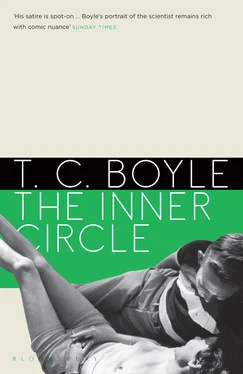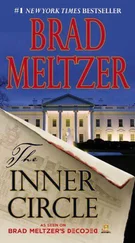I nodded. We were hurrying along so fast I was on the verge of breaking into a jog. “She’s been with him the past three nights and she, she came home only to get her things last night and she told me she was”—I felt ridiculous saying it, but I couldn’t stop myself—“doing research. ”
Suddenly we were stopped dead in our tracks, right there in the middle of the sidewalk, a pair of student lovers splitting up to edge around us on either side, the trees wheeling overhead and everything aside from Prok’s face, his glasses, his eyes, rushing past in a blur of motion. “Research?” he said. “But that’s absurd. It’s wrong. And you know, John, you of all people, because I’ve emphasized it over and over again, how much our work depends on the public perception of it?”
“Of course. That’s what I’m saying.”
His jaw was set. The wind, if there was a wind, might have ruffled the stiff crest of his hair. “We can’t afford to give them any ammunition.”
“No, of course not.” I wanted to look away. There was fluid in my eyes — tears, that is — and I didn’t want to expose myself.
“You and Mac, for example. Mutually beneficial, just as I’ve said all along, pleasure given, pleasure taken. That’s the way it should be. We need to break down our inhibitions and express ourselves to the fullest, I do believe that with all my heart. But it has to be kept strictly confidential, and every one of us — not just the husbands but the wives too — must understand that we’re part of something larger here, much larger. And under scrutiny, under the microscope, John. You know that, don’t you?” He caught himself. We were still rooted there, and he made as if to move off, but caught himself again. “Has anyone seen her with him, seen her go to his apartment?”
“I don’t know,” I said miserably. I was studying the pattern of the sidewalk. I couldn’t look him in the eye. “But I don’t see how, well, in a small town like this — or not for long, anyway.”
Prok didn’t curse. He never used expletives or indulged dirty jokes, though of course in later years he was deluged with them, but now, standing there in the street, he came as close to it as I can recall. He spat something out, some Latin term, and then we were walking again and he was muttering about Corcoran, about how he blamed himself for not making the situation “absolutely clear, so clear any idiot could see through to the truth and necessity of it.” We crossed Atwater, then Third, moved up the walk and into the aegis of the big looming limestone buildings of the campus. “I’m sorry, John,” he said, pinning me with his gaze as if I were the one threatening to bring the research down, “but we just can’t have it.”
Two weeks later, though her daughters’ school was still in session and they would have to miss the last six weeks of the term, Violet Corcoran left South Bend and moved into her husband’s cramped apartment on College Avenue in downtown Bloomington. She took charge of things right away, opening up an account at the grocery, arranging for a tutor and putting Lloyd Wheeler, the best real-estate agent in town, on the trail of a suitable property, with a yard for the girls, a garage for the Cadillac and shade trees to mitigate the summer heat. Prok had had a talk with Corcoran — he came right up the stairs of Biology Hall the morning I’d voiced my complaint, slammed into the back office and chewed him out, in no uncertain terms — and Corcoran had a talk with Iris five minutes later, on the telephone to his apartment. All the while I sat at my desk, drinking coffee as if my veins flowed with nothing else.
If I think about it now, I have to chalk the whole thing up to Iris’s immaturity — she was just twenty when we married and, as I say, hadn’t had any previous experience with men, and perhaps that was unfair to her, or certainly it was, especially in the context of the project we were all engaged in and the relations I’d had outside of the marriage. She had no way of gauging what she was doing, of putting a cap on her emotions and keeping things in perspective — she was infatuated, that was all, like so many of the teenage girls we interviewed over their first crushes and so on. Above all, she was stubborn. Once she set her sights on something, it was hard to turn her, and when she came through the office door an hour later, her face drained of color and her eyes red-veined and swollen, I can’t say I was surprised, though I shrank inside. Prok happened to be standing over me, comparing a chart with one of mine, and Corcoran, the self-satisfied smile for once kneaded out of his features, sat hunched at his desk in the back room. “You can’t do this,” she said.
I was on my feet before I knew what I was doing, before I realized she wasn’t talking to me at all. Corcoran swung round in his chair, his eyes shrunk back in his head. He was wearing his two-tone shoes, I remember, and he began to grind one foot into the floor as if he were putting out a cigarette. Prok laid a hand on my shoulder, and I felt a wave of shame wash over me.
Iris never moved. “You don’t own me — or John or Purvis either.”
“Take your wife out of here, Milk, will you,” Prok said. “Take her home.”
“No,” she said, her voice rising, “no — not until you tell me who elected you God.”
“Corcoran,” Prok called over his shoulder, “will you come in here please,” and we all watched as Corcoran pushed himself up from the desk and crossed the room on stiffened legs. He edged in beside us, looking unsure of himself, and still Iris hadn’t moved from the doorway.
“All right, Corcoran,” Prok said then, and I hadn’t gone to my wife, hadn’t touched her, the three of us ranged there against her like a scrum awaiting the drop of the ball. “Just tell me please if you’ve explained the situation to Mrs. Milk?”
Corcoran bowed his head. “Yes,” he said.
“I’m sorry, I didn’t hear you—”
Corcoran looked first to Iris, then to me. “Yes,” he repeated.
“Good,” Prok said, “very good. And, Iris, if you would”—and he was already moving forward, already taking her by the arm and guiding her toward the door of the inner room—“I’d just like to have a few words with you in private, if I may.”
Then the door closed and I went back to work.
I don’t think any of us — not Prok, my fellow members of the inner circle, President Wells, the NRC or even the W.B. Saunders Company, Philadelphia, the book’s publisher — was quite prepared for the furor that greeted publication of the male volume in January of 1948. Prok had chosen Saunders, a staid and colorless publisher of medical texts, over the big commercial houses in New York (and believe me, once word was out, they all came knocking), in a conscious effort to avoid any sort of misguided marketing effort or sanguine publicity that might cheapen or sensationalize our findings. Above all, what we wanted was to be regarded as scientists, to legitimize the field of sex research and elevate it to its proper place among the behavioral sciences, and yet at the same time there was a real reformer’s zeal in Prok that made him want to deliver up our results to the widest possible audience. And so, yes, he did arrange for press interviews — press conferences, actually — so that the word would get out, but in a sober, rational and controlled way. And he chose Saunders to produce the book in a plain, no-nonsense hardcover volume that was indistinguishable from any other scientific or medical compendium sitting forgotten on the back shelves of bookstores, libraries and physicians’ offices. It sold for $6.50, or more than twice what the average book retailed for at the time. There were 804 pages, including appendices, tables, bibliography and index. And it was dedicated, soberly enough, “To the twelve thousand persons who have contributed to these data and to the eighty-eight thousand more who, someday, will help complete this study.”
Читать дальше












